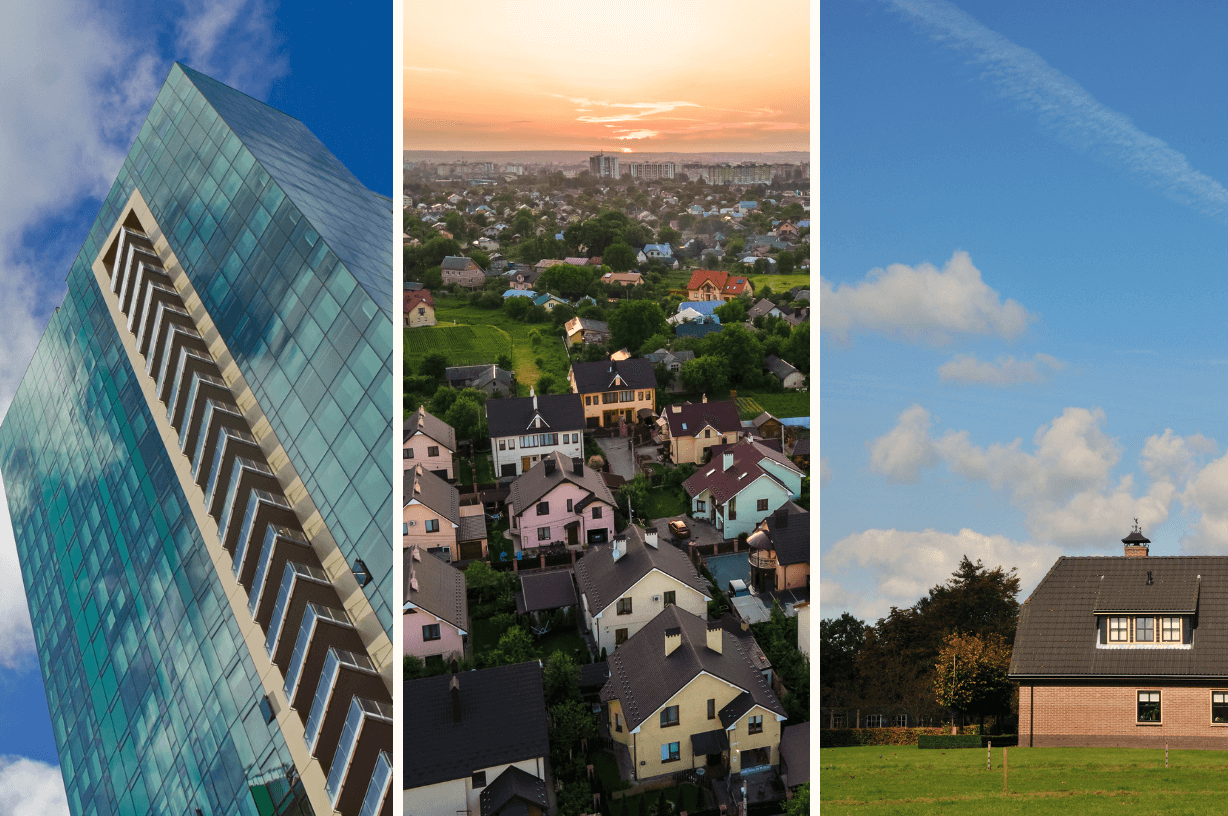Buying a house means putting down roots for a while, but people — just like plants — don’t all thrive in the same environments.
The choice between urban, suburban and rural living is a deeply personal one. It’s influenced by such diverse factors as your personal preferences, career opportunities and family dynamics. Before you decide what’s right for your needs, knowing a little more about the advantages and disadvantages of each setting can help you make a more informed decision.
Urban Living
Urban areas are bustling with energy, offering myriad advantages for those seeking a fast-paced and vibrant lifestyle.
Some of the pros of urban life include:
- Cultural and Entertainment Opportunities: It’s not hard to find something new and exciting to do in a city when you have easy access to museums, theater productions, art shows, concerts and festivals. If you love a kinetic nightlife and diverse culinary scene, or just like to explore new things, city life could be right for you.
- Employment and Career Opportunities: Urban areas are often economic powerhouses, attracting businesses across multiple industries. This translates into more job prospects and career advancement opportunities — and, quite often, an easier commute.
- Convenience and Amenities: If you love the idea of having a grocery store, wine shop, corner bodega, library, coffee shop and your choice of health care facilities close by, city life is likely a good fit. You may also be able to take advantage of the public transportation system, usually unparalleled when compared to suburban or rural areas.
- Diversity and Community: Cities tend to celebrate diversity and multiculturalism, creating a sense of inclusivity and open-mindedness. People who tend to explore the “alternative” side of life often find other, like-minded folks around and feel more accepted in urban areas.
However, urban life isn’t always ideal. Some of the cons include:
- A Higher Cost of Living: That desirable city lifestyle often comes with a price tag that can really pinch your wallet. Housing and food costs are higher, and entertainment is more expensive in the city.
- Noise and Crowding: That constant hustle and bustle that comes with urban life can be great unless you’re sensitive to noise pollution and the relative lack of privacy. When even the parks can be crowded, city life can be mentally and emotionally taxing.
Cramped Spaces: Urban life often translates into smaller spaces, especially in densely populated areas where rents for closet-sized apartments can go for premium prices.
Suburban Living
As railways and roads created new infrastructures, suburbs allowed families to live further away from their jobs. The ‘burbs were custom designed to be the “best of both worlds,” mixing urban and rural amenities.
Some of the benefits of suburban life include:
- Family-Friendly Atmospheres: Suburbs are known for their peaceful environments that appeal to folks who want a quieter environment than can be found in a city. The proximity of parks, playgrounds and recreational facilities creates a family-friendly atmosphere and plenty of room for kids to play outside.
- More Space: If you want more space for your housing dollars, suburban life generally gives you bigger homes, spacious backyards and plenty of room for a family to expand.
- Strong Sense of Community: When you live in the suburbs, you don’t have to go looking for your community — you’re living in it. Suburban neighborhoods tend to be more intimately connected than either urban or rural neighborhoods. That can make them ideal for families with children.
- Access to Nature: When you live in the suburbs, you don’t usually have to travel very far to find large parks, campgrounds, forests and lakes to explore. That can make it easier to get your “nature fix” when you need it, or just to occasionally disconnect from the world.
Suburban life may sound almost flawlessly perfect, but it isn’t. Some of the drawbacks include:
- Long Commutes and Little Transportation: Living in the suburbs often means longer commutes. Often, there’s no getting around the need for a car because public transportation is so limited.
- Limited Cultural and Entertainment Options: The absence of major cultural attractions and the more limited dining and nightlife scene can be a drawback if you crave that kind of regular stimulation.
- Social Conformity: Suburbs have a reputation for being somewhat “cookie-cutter” in appearance, which tends to attract less diversity. If your vibe is quirky or alternative, you may find it harder to establish a strong social network.
- More Maintenance: The one drawback to all that extra living space (indoors and out) is that you must maintain it. That can make things like landscaping and lawn care much more time-consuming or expensive.
Rural Living
Fans of rural living embrace a slower-paced lifestyle that offers a connection to nature that you simply can’t find in urban and suburban settings. The open spaces can absolutely have a positive impact on your mental well-being, especially if you tend to be happiest outdoors.
Some of the other advantages of rural living include:
- A Lower Cost of Living: Rural living typically costs less, especially when it comes to housing. Basic amenities, such as groceries and home services, may also be more budget-friendly.
- More Privacy: If you hate feeling like someone’s always looking over your shoulder, rural life might be right for you. When your closest neighbors are a field or so away, you can easily maintain your peace and your privacy.
- Lower Crime Rates: Particularly when it comes to thefts and violent crimes, crime statistics tend to be much lower in rural areas. There, everyone pretty much knows everybody on sight, so strangers and suspicious activities stick out.
Rural life isn’t for everyone, however. You may not like it because it also has:
- Limited Opportunities: Want to switch careers? Want to sign up for a yoga class? Want to join a theater group? You may have a hard time finding new opportunities for advancement in your professional and personal life in a rural area.
- Long Commutes: Unless you’re lucky enough to have a career that lets you work entirely from home, you could be looking at a killer commute from your rural enclave.
- Limited Amenities and Little Diversity: Rural areas tend to be very homogeneous in composition, and you don’t have a lot of choices when it comes to shopping, home services, entertainment or dining. That can be hard to get used to if you’re accustomed to more opportunities.
Making the Right Choice for Your Lifestyle
Each of these settings offers unique advantages and disadvantages. Consider your priorities, envision your future and talk to your real estate professional about your goals. Remember, finding the right balance between your personal preferences and the practical realities of each environment is crucial to living a fulfilling and happy life.
amanda.phillips@talktotucker.combill.ingram@talktotucker.combrad.layton@talktotucker.comeditors-pickerina.pribyshchuk@talktotucker.comfeaturedlloyd.zimmerman@talktotucker.commark.callahan@talktotucker.commary.layton@talktotucker.compriscila.hale@talktotucker.comterri.mcgraw@talktotucker.com




